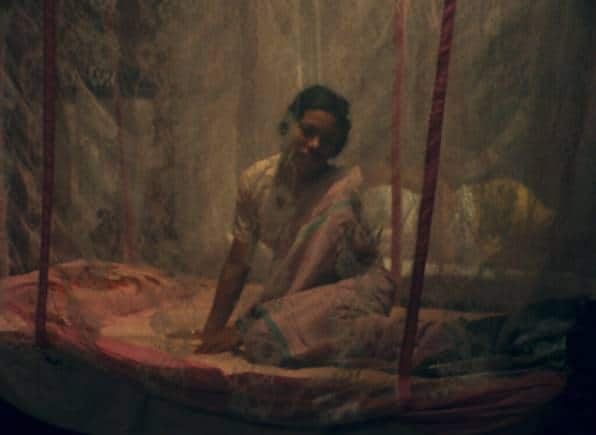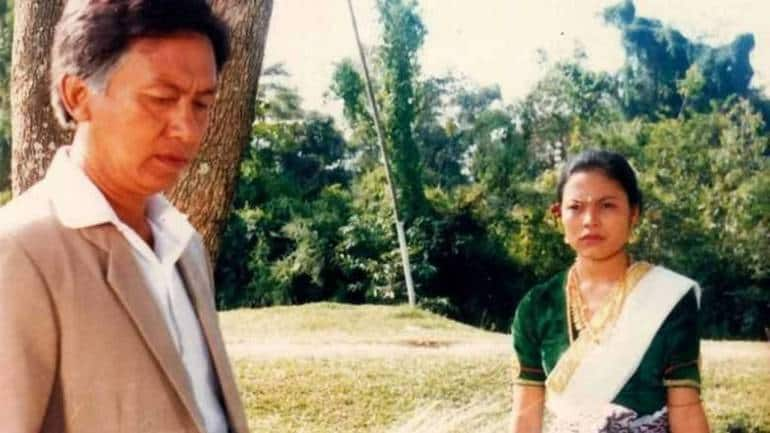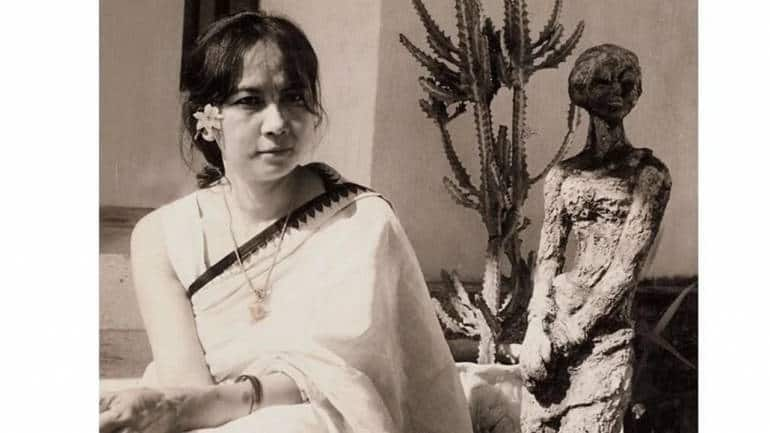



The Manipuri classic Ishanou or The Chosen One, which first aired in Doordarshan in 1990 and subsequently released in theatres in Imphal and screened at the Un Certain Regard section of the 1991 Cannes Film Festival, has some philosophical similarities with the ferociously death-affirming Korean novel, Han Kang’s The Vegetarian, which first came out in 2007 and introduced to the world to sensational response with an English translation by Deborah Smith in 2016.
The first sentence of Han Kang’s novel is innocuous: “Before my wife turned vegetarian, I thought of her as completely unremarkable in every way.” In Ishanou, the quiet but relentless inner horror and suffering of Han Kang’s protagonist is almost absent, but here too, Tampha, a gorgeous young woman living in blissful, ordinary domesticity with her husband and daughter gets a call from the mystical world of forests and a sacred matriarchal sect — entrenched in Manipur’s Maibi culture — and she responds to the call, setting in motion surreal, violent and neurotic lapses of reason. Tampha talks to flowers, she wanders out of her home in the middle of the night, and she gets violently dizzy spells. In both the novel and film, an ordinary woman banishes ordinariness in the most subversive of ways, making those around her not just angry and frustrated, but also spellbound, even eventually reverential to their madness.
 A still from 'Ishanou'.
A still from 'Ishanou'.
Ishanou is Manipur’s oldest film to be celebrated the world over. It is based on a short story of the same name by Maharaj Kumari Binodini Devi, a literary stalwart from Northeast. She also wrote the film’s script. Sharma, a filmmaker and music composer, combines the occult and the mundane, the literal and the philosophical, staying close to Maibi culture and its rhythms. Sound matrixes arising from combining the Pena, a mono-string instrument of Manipur, the bamboo flute, incantations and hymns, Ishanou is storytelling, documentary and ethnography, all in one. It set an example for filmmaking in the state — the region’s most prolific filmmaking state besides Assam — that still likes to juxtapose traditional wisdom with the zeitgeist.
In 1991, film critic Derek Malcolm, who was then a celebrated critic at The Guardian, wrote about Ishanou: “Perhaps the best film in the panorama, largely because it tells a good story with great honesty and lack of guile, came from the State of Manipur, where two or three directors have worked against all odds for a decade or more.” In 2022, the film was restored by the Mumbai-based Film Heritage Foundation in collaboration with its producer-director Sharma and the Manipur State Film Development Society. On some reels, the negative had suffered from vinegar syndrome degradation, mould and warping, broken perforations, scratches, emulsion halos, and base distortion. Film Heritage Foundation conservators put in arduous effort and a lot of time to fix the negative before it could be digitised using a wet-gate scanner at L’Immagine Ritrovata in Bologna. Ishanou is also the first Manipuri film to be digitised.
Ishanou’s selection comes at a time when the state is limping back to normalcy after one of its worst episodes of ethnic clashes in recent times, in which more than 70 have so far been dead, and 30,000 forced to flee. The violence broke out in the first week of May after the Kukis began their protests against an order passed by the Manipur High Court directing the state government to consider including the Meiteis in the list of tribal communities in order to grant them benefits under India’s affirmative action programmes. Food became scarce, a curfew was imposed by the Indian Army, the internet remains suspended, shops and school remains shut and people huddled around crowded, unsanitary refugee camps. “This is a civil war situation,” John Mamang, a lawyer and relief volunteer in the town of Churachandpur, was quoted as saying in the national media.
 A still from 'Ishanou'.
A still from 'Ishanou'.
While Manipur’s history of ethnic strife, violence against women under Armed Forces (Special Powers) Act (AFSPA), 1958, before it was lifted in some parts of the state, its remarkably audacious women including Irom Sharmila and several others have been documented and reported on, the cultural agency of Manipur is still not known to most of India. It is home to a classical Indian dance form, music bands such as Imphal Talkies and the Howlers, several authors and poets, including legends such as MK Binodini Devi and new poets such as Robin Ngangom, to Ratan Thiyam, a pioneer of the ‘Theatre of Roots’ movement, whose work in performance art and theatre often combines Shakespeare, Maibi culture, stories from the Mahabharata, martial arts from Japan and Manipur, and to several new filmmakers who are rephrasing and redefining the tradition-verses-new world ideas using technology and out-of-the-box visual languages. Around 80 films are made in Manipur every year — from the state’s first feature film Matamgi Manipur (1972) to this year’s Oneness by Priyakanta Laishram, Manipur’s first LGBTQ-themed film, its film culture is now expansive. In the Mahabharata, Manipur is a kingdom called Manalura, home to Princess Chitrangada, one of Arjuna’s four wives.
Ishanou’s return to Cannes at this time has a symbolic significance. Despite being torn by separatist currents, dictated by its collective history, Manipur’s cultural agency is still one of India’s best representatives in the world’s most elite film congregation. MK Binodini Devi’s story has a timeless quality — most of her writing has the provincial ring, but like the best of stories, its provinciality rises to the universal.
 Aribam Syam Sharma’s ‘Ishanou’ was written by Northeast’s literary stalwart MK Binodini Devi.
Aribam Syam Sharma’s ‘Ishanou’ was written by Northeast’s literary stalwart MK Binodini Devi.
Sharma has earlier made a documentary on Devi. A princess by birth, she was a versatile writer and had a multi-disciplinary approach to her art and activism. Her exposure to art was at Santiniketan, where she studied painting under Nandalal Bose and Ramkinkar Baij, and happens to be the first published woman writer of Manipur. Awarded with the Sahitya Akademi Award and the Padma Shri, Devi returned the latter in response to the alleged rape and killing of Thangjam Manorama by 17 Assam Rifles personnel in 2001. She wrote dance dramas, travelled extensively around the world and was involved in writing film scripts and collaborating with filmmakers until she passed away in 2011. She says, in the documentary, “I consider myself very fortunate to be born as a woman. I was the youngest of five sisters. Perhaps, mother wanted a son, but from my childhood I never felt inferior as a woman even for a moment.” Incidentally, one of Devi’s nieces, Lakshmipriya Devi, a film director working in Bollywood who has worked with leading production houses and banners, is currently shooting her debut feature film, a story set in Manipur, in Manipur.
Discover the latest Business News, Sensex, and Nifty updates. Obtain Personal Finance insights, tax queries, and expert opinions on Moneycontrol or download the Moneycontrol App to stay updated!
Find the best of Al News in one place, specially curated for you every weekend.
Stay on top of the latest tech trends and biggest startup news.